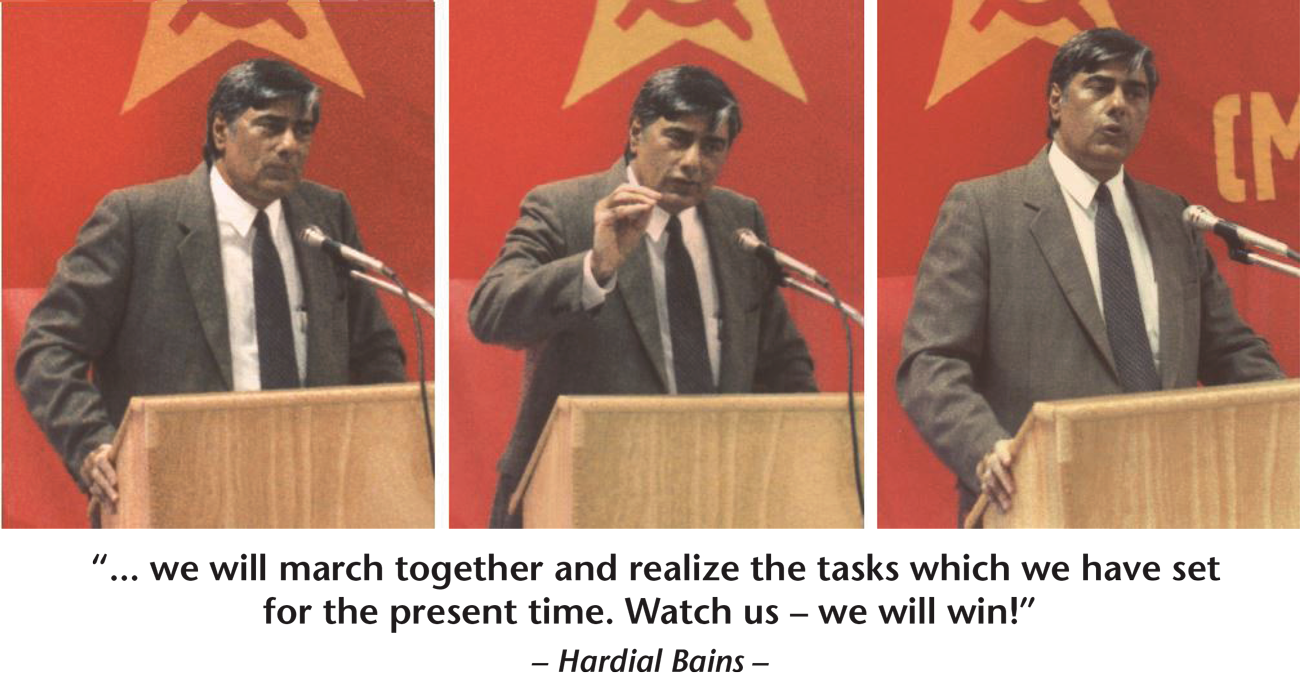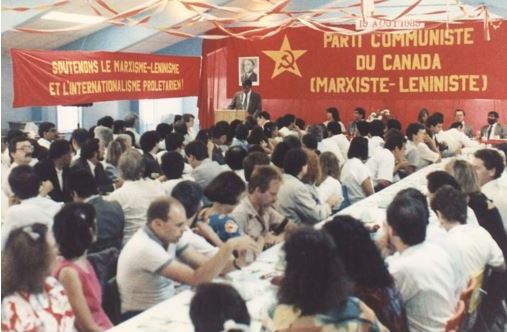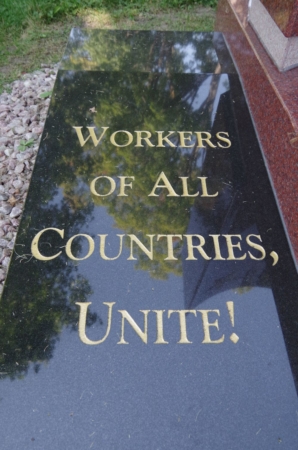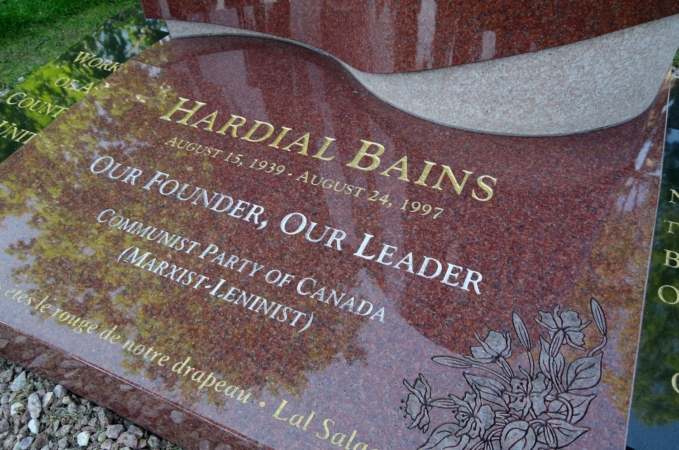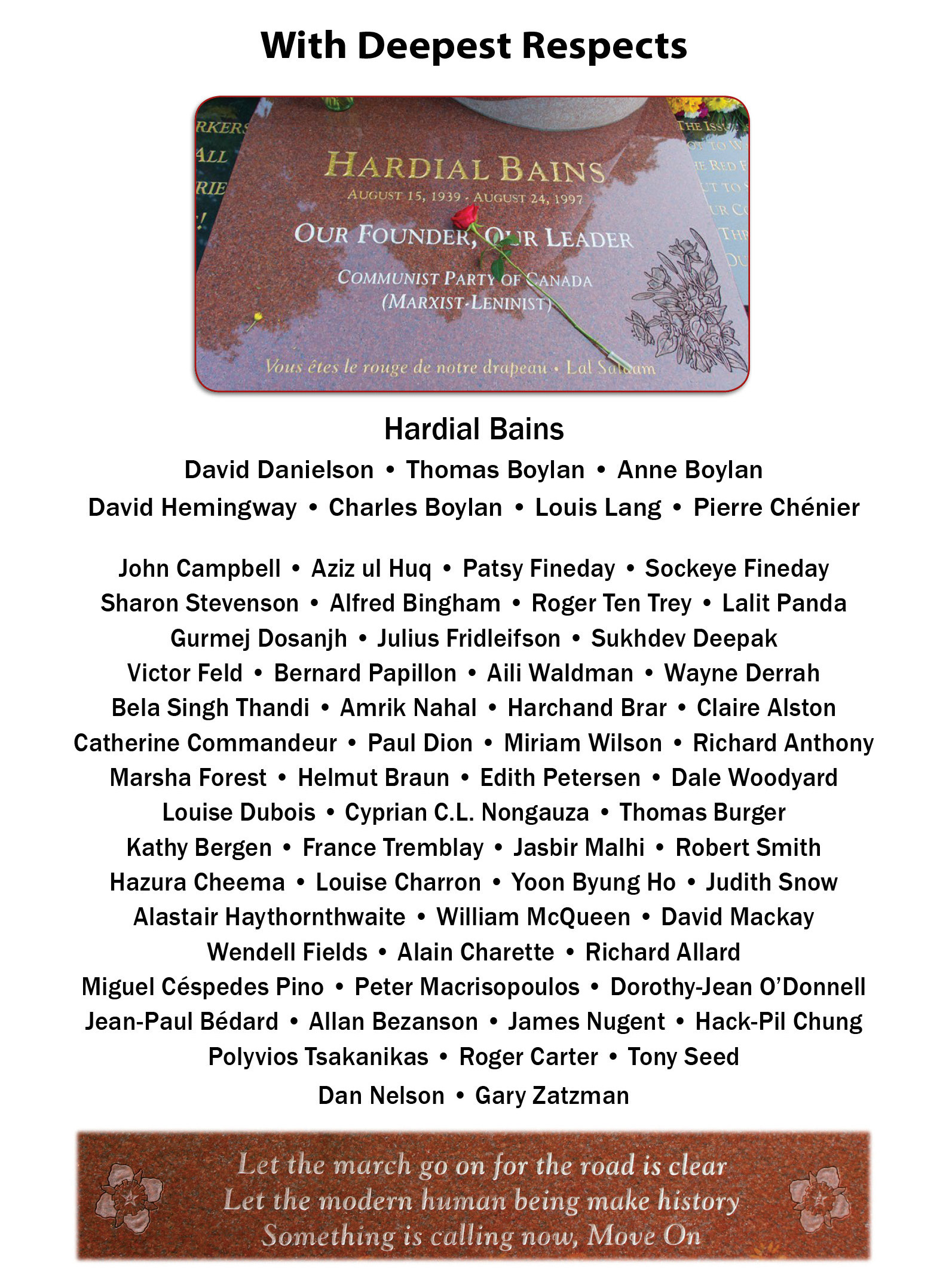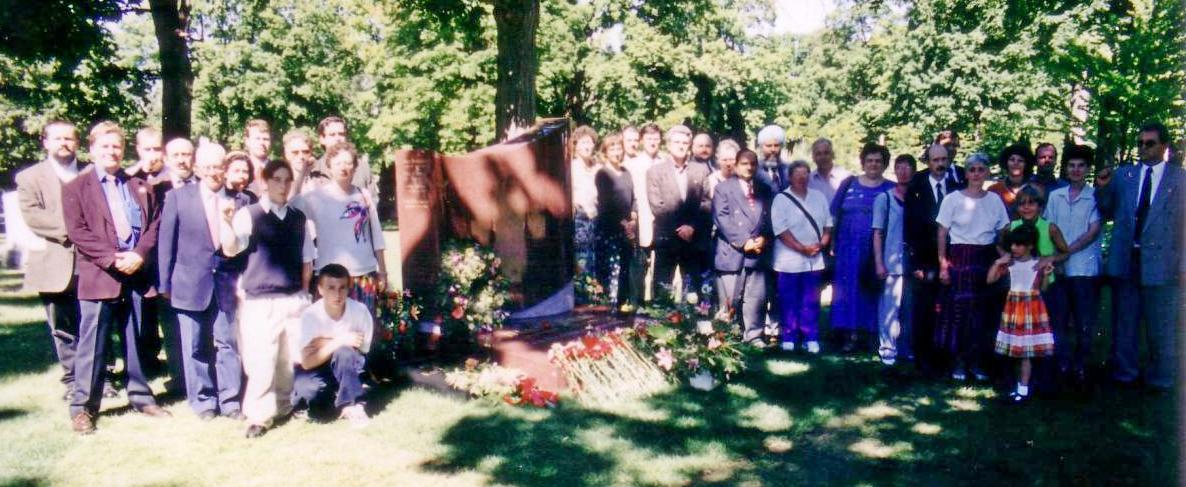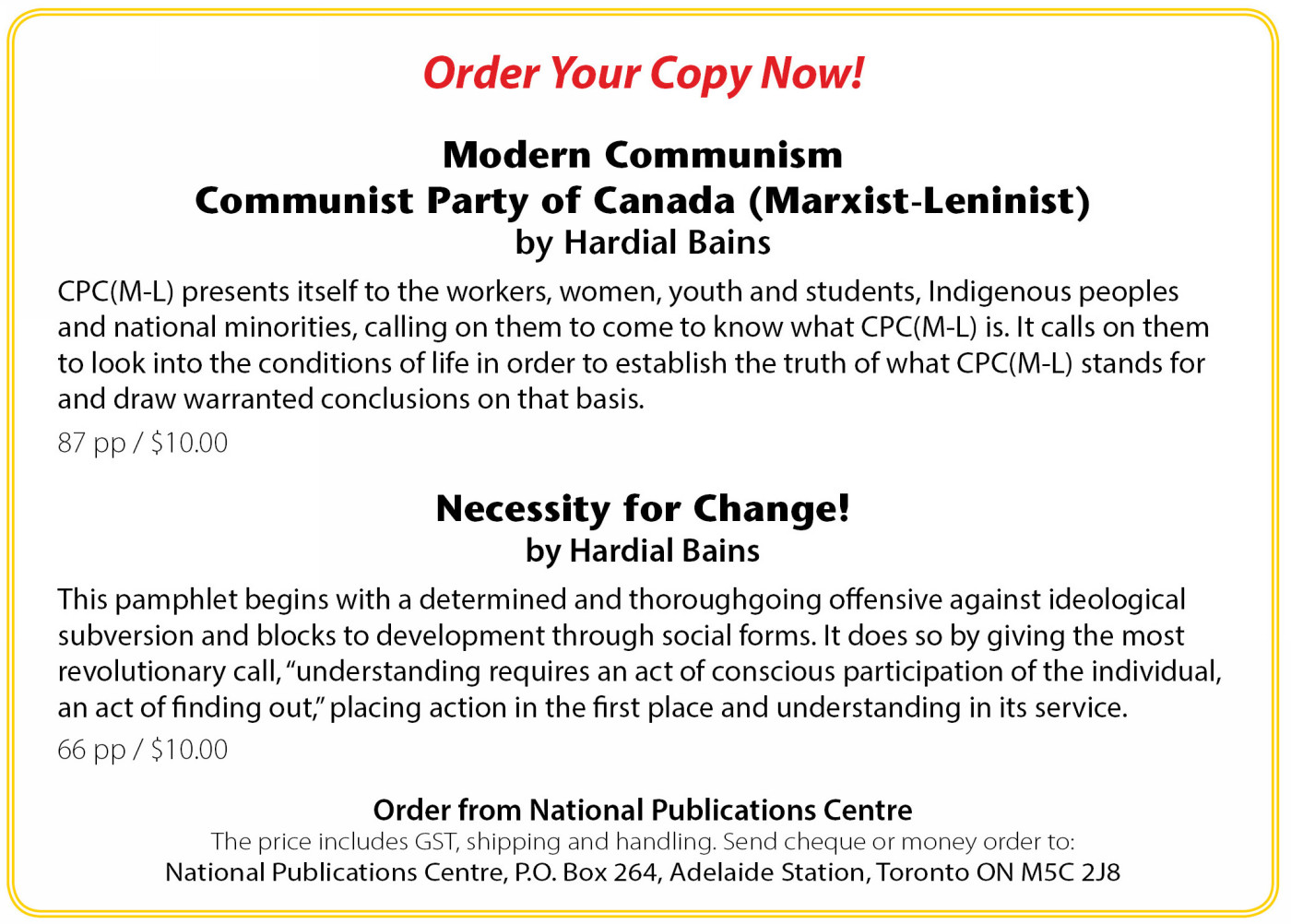No. 8
August 2024
August Celebrations
Answering the Call
of History
Historic
Anniversaries
Hardial Bains -- A Man of
Revolutionary Action
Significance of
1989 Meeting in Chertsey, Quebec
CPC(M-L)'s Memorial in Beechwood Cemetery
Dedication of Party Memorial, August 15, 1999
Video: The Party's Word Is Its Deed
CPC(M-L)
Emphasizes Need to Pay Serious Attention to
Elaboration of Modern Communism
Author's Preface
to 1998 Edition of
Necessity for Change
August Celebrations
Historic Anniversaries
Every year during the month of August, the Communist Party of Canada (Marxist-Leninist) organizes special activities to discuss the significance of important events in the life of the Party. These events celebrate the movement that gave rise to the Party itself and all those who have contributed and continue to contribute to its development.
 The theme of these celebrations this
year is Answering the Call of History 35
Years Since Chertsey. The events include the celebration
of
the 85th anniversary of the birth of Hardial Bains, the founder
of CPC(M-L) and the First Secretary of its Central Committee
until his untimely death in 1997. Hardial Bains was first and
foremost a man of revolutionary action. Thus the celebrations
include study and discussion of the speeches and writings of
Comrade Bains, especially the significance of the Necessity
for Change analysis. This year, besides other
programs, the Ideological Studies Centre is holding seminars on
the
Party's theoretical work on modern definitions based on the
Necessity for Change and the Hardial Bains Party School
is educating Party youth about CPC(M-L) and modern
communism.
The theme of these celebrations this
year is Answering the Call of History 35
Years Since Chertsey. The events include the celebration
of
the 85th anniversary of the birth of Hardial Bains, the founder
of CPC(M-L) and the First Secretary of its Central Committee
until his untimely death in 1997. Hardial Bains was first and
foremost a man of revolutionary action. Thus the celebrations
include study and discussion of the speeches and writings of
Comrade Bains, especially the significance of the Necessity
for Change analysis. This year, besides other
programs, the Ideological Studies Centre is holding seminars on
the
Party's theoretical work on modern definitions based on the
Necessity for Change and the Hardial Bains Party School
is educating Party youth about CPC(M-L) and modern
communism.
The aim of these programs is to enable the youth, advanced workers and party cadres to elaborate modern communism. By taking up this work, they will be able to provide themselves with guides to action and practical ways forward under all conditions and circumstances. Through revolutionary action to provide themselves with the tools and institutions and, most importantly the Party itself, the youth acquire the world outlook they require. This helps them steer clear of all the traps laid for them by those who rule over the society today. These moribund forces peddle the anti-communist, anti-immigrant and anti-worker world outlook designed to keep them in power and make sure the working class can never seize the initiative in its own hands. These programs also aim to enable the youth to develop the enlightenment movement, which they require to build a bright future for themselves. Those who take up the study and discussion of the Necessity for Change and modern communism do so in a concrete practical way by taking up definite problems for solution. Opening society's path to progress within the complex situation we are living through today requires enlightened theory.
August 15-19 also marks 35 years since CPC(M-L) held the historic meeting in Chertsey, Quebec where on behalf of the Party, Hardial Bains boldly reaffirmed the character of CPC(M-L) to march on courageously under all conditions and circumstances as it has always done. The celebrations include discussion of the significance of the historic 1989 meeting in Chertsey, when the world was on the eve of being plunged into the retreat of revolution with the collapse of the former Soviet Union and the regimes in Eastern Europe. The Chertsey meeting affirmed that no individual, collective or social force could act in the old way but had to find their bearings in the new conditions of the retreat of revolution. Despite whatever treachery and betrayal should rear its head, Comrade Bains said on that occasion that CPC(M-L) has consistently shown its convictions through its deeds. Its constant work and revolutionary actions show what it means to lead on the basis of mass democratic methods and forms so as to open society's path to progress.
August 15 also marks the anniversary of the historic Necessity for Change Conference held in London, England 57 years ago. That conference provided the Necessity for Change analysis on which CPC(M-L) was founded. The analysis opened a way forward for the youth and student movement at that time. This led to the reorganization of The Internationalists as a Marxist-Leninist youth and student movement in 1968. The Internationalists, originally founded by Hardial Bains at the University of British Columbia on March 13, 1963, was the precursor organization of CPC(M-L).
 Included
in these events is a visit to the Party Memorial in Beechwood
Cemetery in
the national capital. This year on August 11, the Party will
gather to honour the memory of Hardial Bains and all the Party
comrades who have passed away who represent the spirit of
Chertsey, the defiance expressed by Comrade Bains on that
occasion to
march on holding high the banner of communism under all
conditions
and circumstances. As the poem inscribed on the Party
memorial reads:
Included
in these events is a visit to the Party Memorial in Beechwood
Cemetery in
the national capital. This year on August 11, the Party will
gather to honour the memory of Hardial Bains and all the Party
comrades who have passed away who represent the spirit of
Chertsey, the defiance expressed by Comrade Bains on that
occasion to
march on holding high the banner of communism under all
conditions
and circumstances. As the poem inscribed on the Party
memorial reads:
Let the march go on for the road is clear
Let the modern human being make history
Something is Calling Now, Move On
On the occasion of the celebration of these Historic anniversaries, the Central Committee sends warmest revolutionary greetings to all the Party organizations across the country, to all supporters and friends and to all those involved in the crucial work to open society's path to progress. Never has their contribution to making new breakthroughs been more important. Never have they been better served by the model set by CPC(M-L) and its leader Hardial Bains who never wavered, declaring:
We Are Our Own Models!
Show the Party's Revolutionary Colour Through Our
Deeds!
Hardial Bains
A Man of Revolutionary Action
 On August 15,
we celebrate the birth, life and work of Hardial Bains, founder
and leader of the Communist Party of Canada (Marxist-Leninist).
Hardial
Bains was, above all else, a man of revolutionary action. He
came to
Canada as a youth from India in 1959 and immediately integrated
with the life of the working people in British Columbia and
took up the struggles of the student youth with whom he shared
weal and woe.
On August 15,
we celebrate the birth, life and work of Hardial Bains, founder
and leader of the Communist Party of Canada (Marxist-Leninist).
Hardial
Bains was, above all else, a man of revolutionary action. He
came to
Canada as a youth from India in 1959 and immediately integrated
with the life of the working people in British Columbia and
took up the struggles of the student youth with whom he shared
weal and woe.
The late Charles Boylan, who was also a youth at the University of British Columbia at the time Hardial got a science degree, wrote about the conditions in those days.
"Imagine the situation. The world, including the entire range of ideological and theoretical schools of thought, was frozen in Cold War dogma. Disinformation and misinformation were the norm, whether it came from the schools of Euro-American imperialism or the schools of Euro-Soviet communism. A condominium of reaction undermining the historic achievements of communism, revolution and national liberation was in place. All avenues to independent analysis and thinking were barred in practice if not in scripture. Yet the feeling 'the world is not going to remain the same' was pressing on the hearts and minds of the youth. The necessity for change was impelling. What was missing and most needed? What key was necessary to unlock that dialectic of change?
"In 1963, Hardial Bains was a 23-year old graduate student at UBC, who four years earlier immigrated to Canada from Punjab, India to study microbiology. In Punjab, Hardial had earned a well-respected reputation as a deep-thinking revolutionary communist and scientist whose political activism and scientific investigation were said to have begun the moment he could breathe on his own. But what to make of this world in the imperialist heartland and internationally, in which the conditions were so complicated that even the idea of a proletarian front for revolution had been declared a dead letter even by many communist parties?
"The Cold War was suffocating everyone to the point where the right to conscience was banned. Hardial Bains refused to accept the block on thinking and called on students and faculty to defend themselves and express their right to conscience through actions with analysis. One of his first public acts was to stand up courageously to the 'better dead than red' psychological terrorism of McCarthyite anti-communism. At a mass democracy meeting, standing atop the popular soap box in the public square in front of UBC library, Hardial faced down the hysterical finger-jabbing scream from the fringe, 'That man is a communist!' replying instantly, 'Yes, and proud of it!'
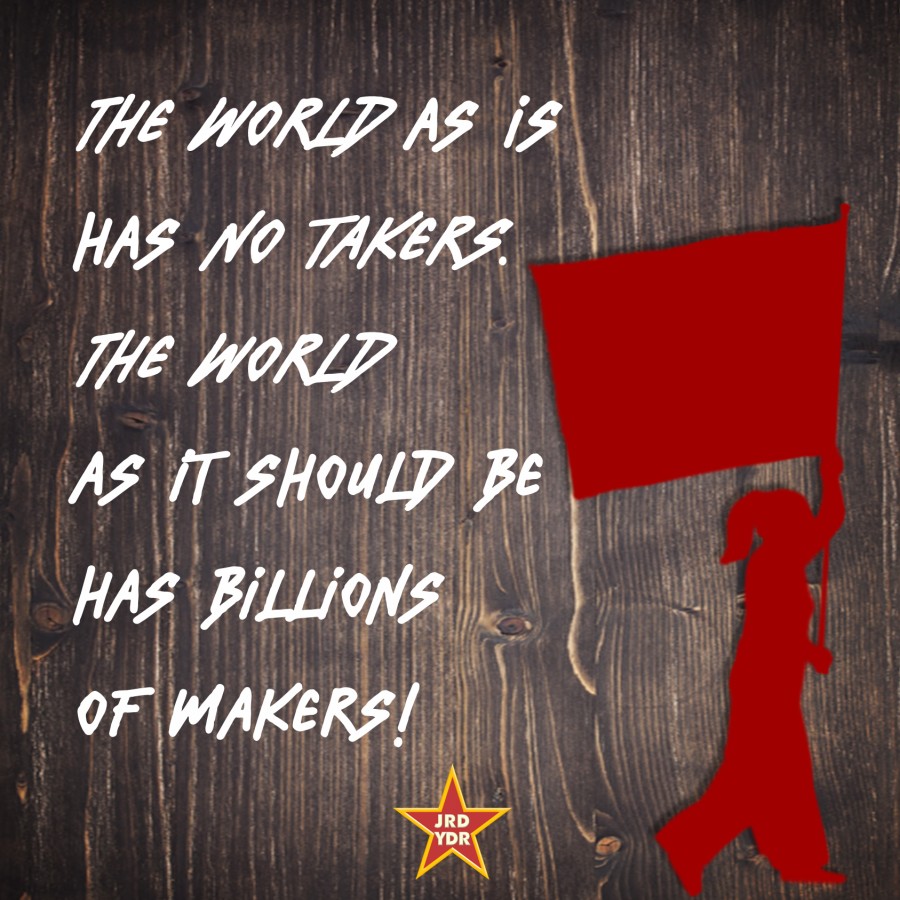 "Reflecting upon the incident
later, Hardial said this response was a historic turning
point in the sense that it publicly 'smashed the cringing
cowardice and spinelessness of the communists of the time.' The
refusal to defend one's right to conscience became a feature of
the
past. Communists were called upon to be open and proud of their
views and the accomplishments of the workers' and communist
movement. This was the 'beginning of the New. Nothing can stop
this movement now,' he concluded from this experience. But the
New was small like a single cell of an organism beginning its
journey in life."
"Reflecting upon the incident
later, Hardial said this response was a historic turning
point in the sense that it publicly 'smashed the cringing
cowardice and spinelessness of the communists of the time.' The
refusal to defend one's right to conscience became a feature of
the
past. Communists were called upon to be open and proud of their
views and the accomplishments of the workers' and communist
movement. This was the 'beginning of the New. Nothing can stop
this movement now,' he concluded from this experience. But the
New was small like a single cell of an organism beginning its
journey in life."
Hardial had the ability to listen to and heed the call of history to organize to bring about the changes required to open society's path to progress, always keeping in sight how to remove the main obstacle to moving forward. He based his actions on what the situation revealed in the particular conditions and circumstances, ensuring an organization was put in place to gather together all those in whose interest it was to bring about the required changes to the conditions. For this to occur, he always followed the dictum: Unite the Advanced Forces to Mobilize the Middle and Isolate the Backward. He made sure that the clash between Conditions and Authority would be resolved in a manner which favoured the interests of the working peoples at home and abroad and the cause of the peoples and nations everywhere for peace, freedom and democracy.
Hardial Bains heeded the call of Engels that Marxism is Not a Dogma but a Guide to Action. He also profoundly followed the maxim No Investigation, No Right to Speak to emphasize the necessity of going into the heart of the matter at any time so as to discern the line of march and devise as its integral part the tactics required to achieve the aim set. In this way, Hardial set an example of what it means to oppose the disinforming role of the state, which seeks to deprive the people of their own ability and outlook to establish their own vantage points and act in a manner which favours their interests.
Of all the relevant writings and documents Hardial Bains produced during his lifetime, the most significant was the Necessity for Change analysis. It drew warranted conclusions about the degenerate culture and conditions imposed on the youth as a result of the Anglo-American imperialist influence during the 1960s and the anti-communist crusade. Based on the Necessity for Change analysis, he concluded that Understanding Requires an Act of Conscious Participation of the Individual an Act of Finding Out.
As he famously wrote in the Necessity for Change pamphlet, which sold thousands of copies amongst the youth and students and revolutionary forces in the 1960s, this call places revolutionary action at the centre of all our endeavours. Only when an individual is in the fray, in the battle, with the aim of humanizing the social and natural environment in the specific circumstances faced, does the line of march emerge from what the situation reveals. Only on this basis of putting revolutionary action at the centre of our concerns, can one be worthy of calling oneself a Marxist-Leninist, Hardial pointed out.
By paying attention to what is continuously coming into being and passing away, which we call the ensemble of relations of humans to humans and humans to nature, the necessity for change is revealed as the need for the people to establish their own political power in the course of settling scores with the old conscience of society. Only then will the pre-history of humankind give way to the people themselves becoming the makers of history. From the old way of handing over the use of their voice and name to others, the people will finally speak in their own name, Hardial forcefully pointed out.
At each stage of the development, Comrade Bains led members and supporters to achieve numerous significant accomplishments, including:
- uniting the Marxist-Leninists in one organization based on Marxism-Leninism and democratic centralism in the late 1960s;
- founding the Communist Party of Canada (Marxist-Leninist) in 1970, as the necessary instrument to forge the unity of the working class to accomplish its mission of constituting the nation and vesting sovereignty in the people;
- taking bold stands in defence of all when the state launched racist attacks against Afro-Canadian students, as well as the Indigenous Peoples and peoples of South Asian and West Indian origin in the late 1960s and early 1970s;
- establishing on a profound anti-imperialist basis the solidarity movement in this country to support the struggles of the peoples of Asia, Africa, Latin America and the Caribbean for liberation. Included within all this was the militant support he organized for an independent Cuba against the Bay of Pigs invasion and during the so-called missile crisis, and for the national liberation of Vietnam and other countries of Indo-China fighting against U.S. imperialist aggression.
He also led the reorganization of the Hindustani Ghadar Party abroad in 1969, on the basis of democratic centralism to carry forward the traditions of the Ghadri Babas and for the liberation struggles in India.
Hardial's important contributions also included the defence of Marxism-Leninism and the elaboration of Contemporary Marxist-Leninist Thought. His work in the field of philosophy and the social sciences included paying first-rate attention to the crucial relationship between form and content, and to the study of Marxism-Leninism amongst the youth, and to push forward the movement for enlightenment. He spearheaded building the Party press and non-Party press and the technical base for the work of the Party on every front. His contribution to the study of the constitution of European nation-states and how sovereignty was established in a fictional person of state to deprive the people of decision-making power led to the powerful program of opposition to euro-centrism, reliance of each people on their own thought material and for democratic renewal and the call to break with the past and move on.
 His feats are indeed legendary
for the boldness which characterized them. He was
fearless in the face of the repercussions of daring to defy the
Anglo-American authority which, under the aegis of
democratic liberties, permits only those activities the ruling
elite
deem fall within "reasonable limits." Our comrades spent much
time in jail and many lost their jobs and careers because the
forces that exist above the people decide what is
"reasonable."
His feats are indeed legendary
for the boldness which characterized them. He was
fearless in the face of the repercussions of daring to defy the
Anglo-American authority which, under the aegis of
democratic liberties, permits only those activities the ruling
elite
deem fall within "reasonable limits." Our comrades spent much
time in jail and many lost their jobs and careers because the
forces that exist above the people decide what is
"reasonable."
So too the Indigenous Peoples, the workers and minorities and all fighting forces suffer the repercussions of the fact that they exercise no control over the decisions which affect their lives and they are compelled to submit. Those who rule tolerate anything except defiance of their rule. On this basis, they define what is acceptable and inclusive, and what is fringe and extremist and not acceptable under their rule.
Comrade Bains' bold stands brought out the true countenance of what are called the liberal democratic institutions, which the rulers today are even more desperate to preserve and perpetuate. This desperation is becoming increasingly hysterical and irrational due to the evidence showing that the conditions, which gave rise to the nation states brought into being since the English Civil War in the 1660s, no longer exist. The liberal democratic institutions established to sort out the contradictions within the ranks of the rulers and between the rulers and the people so as to avoid Civil War no longer function.
However, the significance of Hardial's work cannot be established by simply providing a sum total of his contributions or deliberating on which of these contributions is the most important. This is why when speaking of significance we speak about things that are signified, which emerge out of the events as they unfold. In French, we say, "the importance of the work of Hardial Bains," which is the same as saying the significance of his work. In other words, "comment cela nous importe" means how the work is relevant to us. In this vein, the work of Hardial Bains brings us a basis for dealing with the world today, what it means to be revolutionary.
For instance, the significance of fidelity to the ensemble of human relations is that modern society has at its heart a power that mediates between the human productive powers and the existing political association. Using fidelity to the ensemble of human relations as a guide, we direct attention to social structure, the order of it and what is its measure, so that we can make predictions.
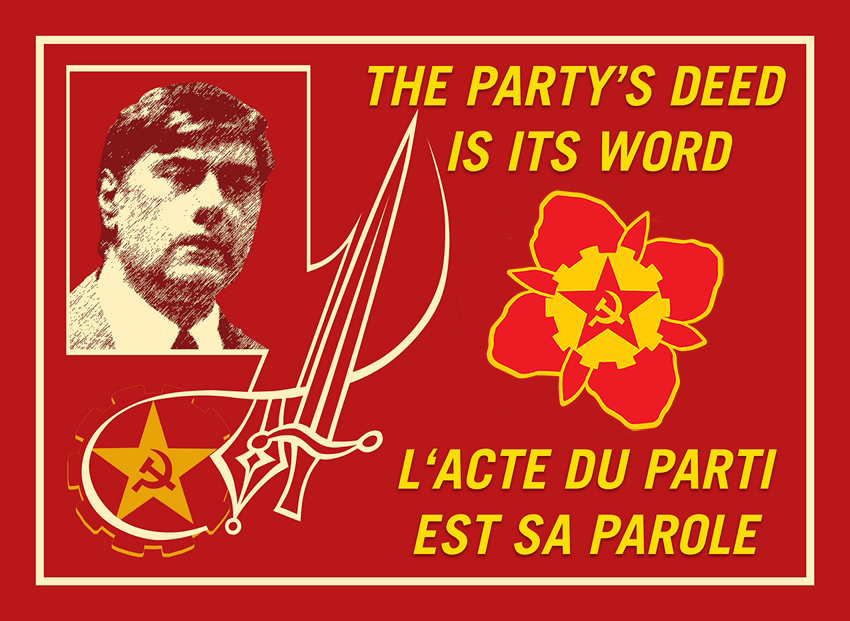 Prediction is
not about events, such as when the arctic ice will melt,
or whether we have 20, 30, less or more years before
irrevocable climate disaster takes place and the world ends. The
significance of having fidelity not to the person of
state and political mythology but to the ensemble of human
relations means that you can make predictions about the plan of
action
and the tactics and organization required to deal with the
problem you have taken up to resolve. You cannot do that without
paying attention to the need to put the individual and
collective interests on par and harmonize them with the general
interest as well as being guided by the relations of the whole
and
the parts.
Prediction is
not about events, such as when the arctic ice will melt,
or whether we have 20, 30, less or more years before
irrevocable climate disaster takes place and the world ends. The
significance of having fidelity not to the person of
state and political mythology but to the ensemble of human
relations means that you can make predictions about the plan of
action
and the tactics and organization required to deal with the
problem you have taken up to resolve. You cannot do that without
paying attention to the need to put the individual and
collective interests on par and harmonize them with the general
interest as well as being guided by the relations of the whole
and
the parts.
Pondering the state of the communist movement after the collapse of the former Soviet Union when the retreat of revolution we are currently experiencing set in and the crimes being committed against humanity began to increase manifold, Comrade Bains said, "If one is a revolutionary and not a Marxist-Leninist, one can become a Marxist-Leninist. But to be a Marxist-Leninist and not be revolutionary that is a problem."
According to the example given to us by Comrade Bains, what then does it mean to be revolutionary?
To be revolutionary, CPC(M-L) points out, is to take up the tasks presented at every period that will actually change or revolutionize the situation. This stands in opposition to providing good descriptions of the situation or hiding behind "correct" phrases.
(Hardial Bains Resource Centre. Published on August 15, 2019, on the occasion of the 80th anniversary of the birth of Hardial Bains.)
Significance of 1989 Meeting in Chertsey, Quebec
The importance of the meeting held in Chertsey, Quebec in August 1989 becomes ever more evident with the passage of time.
At the time of the Chertsey speech the world was in a period of transition from flow of revolution to retreat of revolution. Within a short while the world saw many changes to the situation including the fall of the Soviet Union and the end of the bi-polar division of the world. As Comrade Bains described five years later looking back on the Chertsey meeting, "A great movement of the peoples demanding deep going economic transformations was still in the making and was gaining momentum in various parts of the world, especially in Eastern Europe as well as in some other places. However, this movement turned against itself. It was manipulated by world imperialism and revisionism. From a flow of revolution, the situation turned into one of retreat in a matter of a few months after the Chertsey conference.... [T]he Chertsey conference was for us a statement on the part of CPC(M-L) that not only will the Party not be manipulated by world imperialism and revisionism but that it must continue to carry out its work."
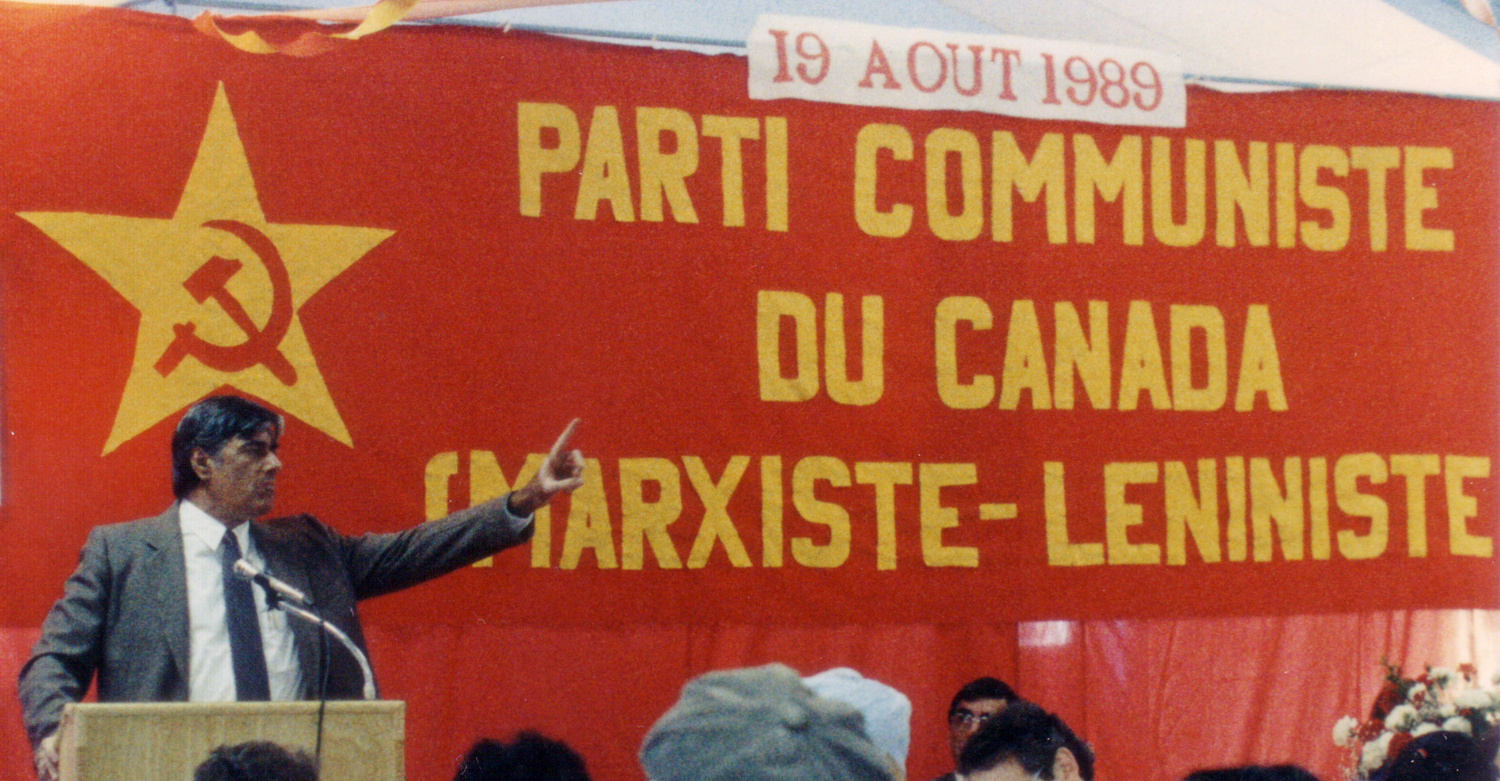
Comrade Bains' elaboration of the nature of that period prepared the Canadian revolutionary forces for what was to come by analyzing precisely what was unfolding nationally and internationally at that crucial turning point. He spoke of the historic world victory led by the Soviet Union and Joseph Stalin against Nazi-fascism and the social programs created by the socialist societies. He warned about the grave dangers posed by Anglo-American imperialism and world reaction and described the great tragedies unleashed on the world's people by U.S. imperialism -- the numerous wars, invasions, coups d'ιtat and medieval violence against the peoples striving for independence and social progress. He warned of greater tragedies to come.
The prediction of Hardial Bains that the anti-communist hysteria being whipped up by world reaction would bring about an assault on the peoples of the imperialist heartlands and elsewhere became a reality. The old world shouted with euphoria that "communism was dead" and "history had come to an end." He predicted that this euphoria would turn into darkest revenge and reaction which is what we are seeing and resisting today. He led CPC(M-L) to prepare for the treachery arising within all forces which persisted in acting in the old way, including within its own ranks. He led CPC(M-L) to stand steadfast and true.
In this regard, Comrade Bains militantly set out what the communists should do next to further build CPC(M-L) as the political party of the working class so as to realize the political unity of the people. Putting greatest emphasis on the need to elaborate theory as the summation of the working class movement for emancipation, he defended the modern communist world outlook as the necessary condition to usher in a human-centred society. He predicted with certainty that the youth, despite all of the anti-communism promoted by reaction, would answer the call of the communists to take a stand for a just cause. He declared, "We say very openly that we want the rule of the working class and no one else... because it is the working class which is the producing class and is the most thoroughgoing revolutionary class whose aims cannot be achieved without overthrowing capitalism through revolution.... Today it does not matter which question is taken up... the bourgeoisie cannot find a solution. Only the working class can find a solution. It is the working class which is at the centre, and our views are the views of the working class."
Comrade Bains pointed out that the most important problem in terms of specific work is to win the mass of workers over to the side of history. "One should go with a passion, like one goes towards a loved one because this beloved of ours, the working class, is the only social force which can save the world, save humankind," he said.
Referring to the grave danger posed by Anglo-American imperialism and world reaction, Comrade Bains pointed out that there is no other way to save the world from the crisis which is looming. "The working class can lose battles but not the war," he said.
He addressed the communist spirit which imbues the revolutionary movement. This movement has given rise to a new personality, he said, because the party carries out its work consciously and with a plan.
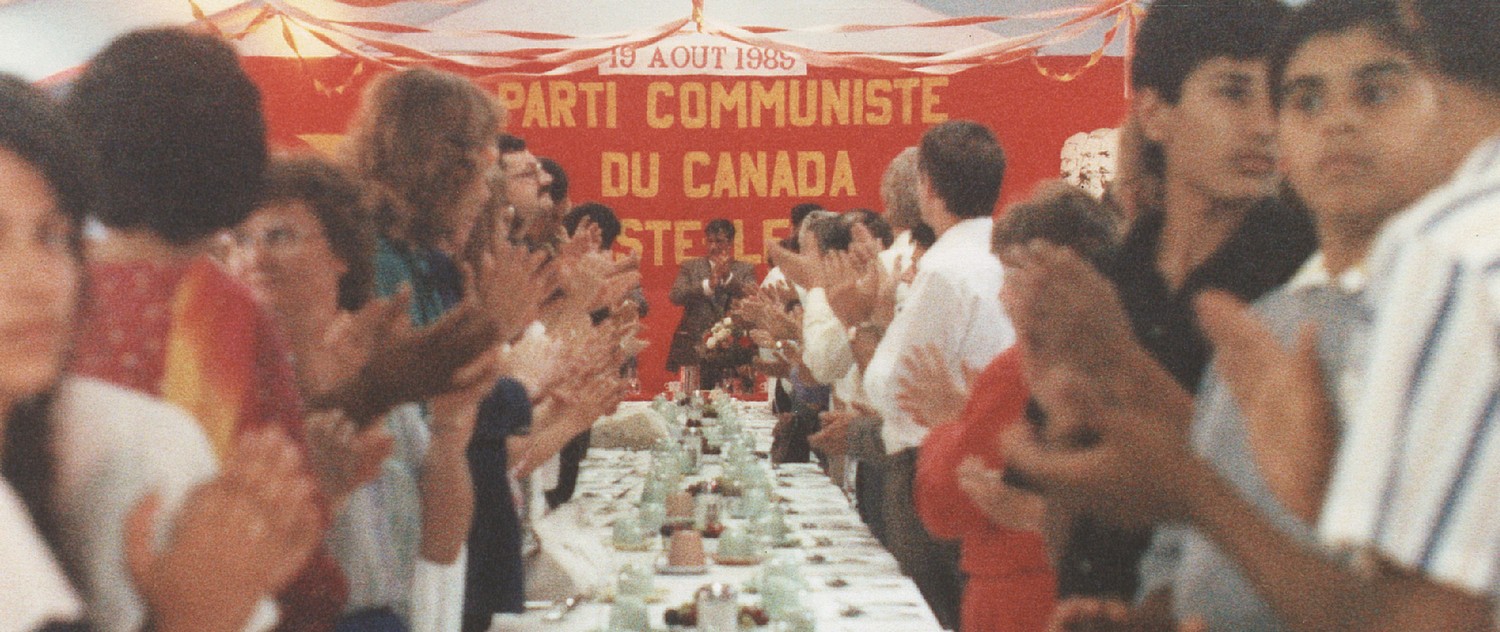
Five years after the Chertsey meeting, speaking about the deed of the party, Comrade Bains pointed out, "In August 1989 on behalf of CPC(M-L) I had declared that new men and women have come into being on the soil of Canada. Who are these new persons, new human beings that came into being? Those who had lofty ideals, honesty and sincerity, a clear conscience and they sacrificed everything they had. They trail-blazed a new way of living under the conditions of capitalist decay. Such a colossal achievement is now coming under fire of those who want a part-time revolutionary lifestyle. They are telling us we are extreme to demand that one should watch one's words and deeds, that CPC(M-L) will not, in any shape or form, conciliate with the filth and rottenness capitalist society in its decay is bringing forth. They are trying to suggest that communists should divide their lives in two: one dealing with the way they carry out politics and the other with the way they live. If we degenerate into such a kind of 'communist' we will become two-faced, we will be a bourgeois decadent force and we are not going to become such a force. We have never recognized imbecility or sterility in terms of our overall work, nor do we accept impotency in the face of the situation. Our Party speaks with the deepest convictions on every front. There is no ocean in the world which is deeper than that. Its ideals are loftier than the highest peaks of the Himalayas and its resolve is such that nobody can yet define it."
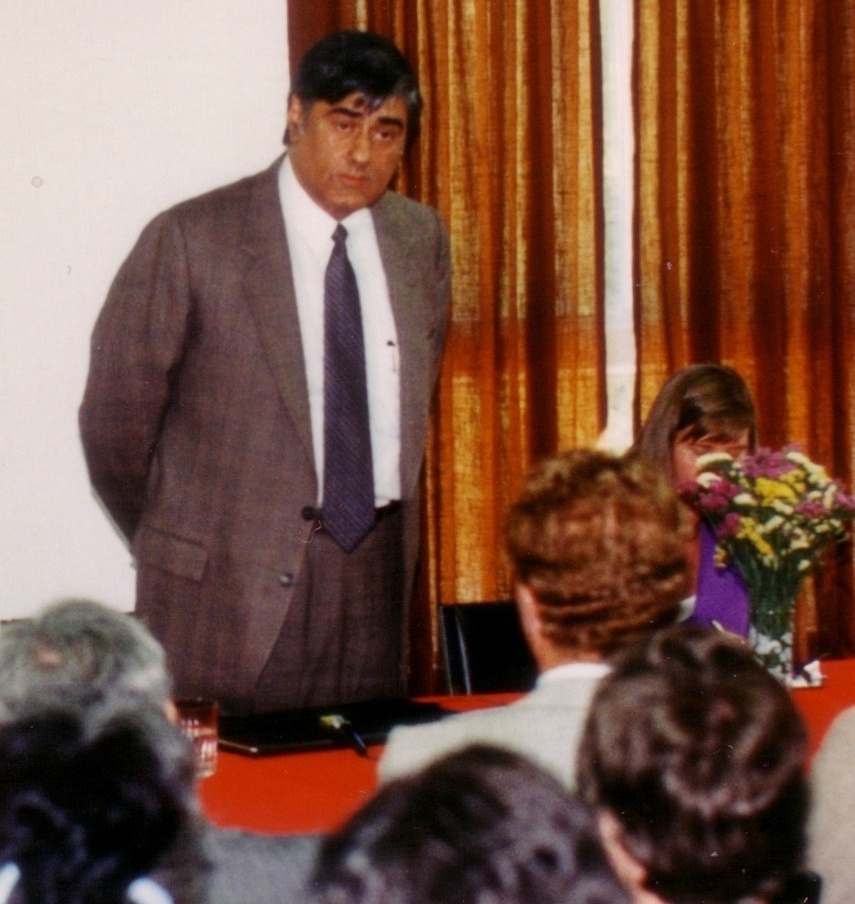 Today, when both nationally and
internationally treachery and betrayal have become a way
of life for the Anglo-American imperialists and big powers of
Old Europe, the Chertsey meeting is an event that assumes
greater significance with each passing day. Chertsey stood then
and stands larger still today as the symbol of strength,
maturity and vitality of the Communist Party of Canada
(Marxist-Leninist). The speech delivered by Comrade Bains
provides crucial guidelines which enable modern human
beings to take control over their lives. It provided the
guidelines
which allowed the Party to launch its nation-building Historic
Initiative in 1995 and the plans of action to stepwise
address its requirements. It led to the adoption of the program
Stop Paying the Rich -- Increase Funding for Social
Programs! in
1997 and, despite the monumental loss of Comrade Bains on
August 24, 1997, to the success of the Party's 7th Congress held
in
1998 which adopted the Party's Historic Initiative and its 8th
Congress held in 2008 under the theme "Laying the
Foundations of the Mass Communist Party."
Today, when both nationally and
internationally treachery and betrayal have become a way
of life for the Anglo-American imperialists and big powers of
Old Europe, the Chertsey meeting is an event that assumes
greater significance with each passing day. Chertsey stood then
and stands larger still today as the symbol of strength,
maturity and vitality of the Communist Party of Canada
(Marxist-Leninist). The speech delivered by Comrade Bains
provides crucial guidelines which enable modern human
beings to take control over their lives. It provided the
guidelines
which allowed the Party to launch its nation-building Historic
Initiative in 1995 and the plans of action to stepwise
address its requirements. It led to the adoption of the program
Stop Paying the Rich -- Increase Funding for Social
Programs! in
1997 and, despite the monumental loss of Comrade Bains on
August 24, 1997, to the success of the Party's 7th Congress held
in
1998 which adopted the Party's Historic Initiative and its 8th
Congress held in 2008 under the theme "Laying the
Foundations of the Mass Communist Party."
Comrade Bains concluded that historic meeting at Chertsey with the exclamation, "... we will march together and realize the tasks which we have set for the present time. Watch us -- we will win!"
(TML Archives)
CPC(M-L)'s Memorial in Beechwood Cemetery
The Communist Party of Canada (Marxist-Leninist)'s magnificent Party Memorial in Ottawa's Beechwood Cemetery is dedicated to the memory of Comrade Hardial Bains, Founder and Leader of CPC(M-L) and to other Party comrades who have passed away. The Party Memorial also pays deepest tribute to the working class of Canada and the fighting peoples of the entire world.
The Party Memorial represents the red flag of modern communism flying over Canada. The red flag bears the hammer and sickle, and the star of CPC(M-L). On one side we read the inscription Workers of All Countries Unite! and on the other the Party's motto, The Issue is Not to Wave the Red Flag But to Show Our Colours Through Our Deeds. On the base, we read: Hardial Bains, August 15, 1939-August 24, 1997. Our Founder, Our Leader, Communist Party of Canada (Marxist-Leninist). The flowers of modern communism are carved on the bottom right hand corner of the base with the lines Vous κtes le rouge de notre drapeau -- Lal Salaam (You are the red of our flag -- Red Salute). On the flagstaff, the red spine of our Party, the names of our three veteran comrades from the time of the Third International are inscribed, Comrades David Danielson, Thomas Boylan and Anne Boylan followed by the names David Hemingway, Charles Boylan, Louis Lang and Pierre Chιnier.
In 1999, the Central Committee decided that all deceased comrades whose nominations are received and discussed amongst their peers and family members and accepted by the Central Committee would be honoured by having their names added to the Memorial on the glorious occasion of the celebration of the Party's 30th anniversary in 2000 and henceforth every year.
The Party Memorial represents the revolutionary quality of commitment to our internationalism, proclaimed by our immortal teachers Karl Marx and Frederick Engels: Workers of All Countries, Unite! You Have Nothing to Lose But Your Chains. You Have a World to Win. The red colour represents the blood of our martyrs the world over. The flag is made from granite quarried in Jhansi, south of Delhi, India. Jhansi itself is legendary in the history of the Indian people's struggle for liberation. Lakshmi Bai, the Rani of Jhansi, was one of the leaders of the First War of Indian Independence in 1857. When the British tried to annex Jhansi in 1853, she assembled a volunteer army of 14,000 rebels to defend the city. During the British attack in March 1858, her valour was exemplary. An Indian ballad sings:
How valiantly fought she,
The Rani of Jhansi
On every parapet a gun she set
Raining fire of hell,
How well fought the Rani of Jhansi
How valiantly and well!
When Jhansi fell to the British, the Rani escaped; again she rallied the rebel forces, this time at the fortress in Kalpi, 100 miles away. The Rani lost her life in the battle but her name and the cause for which she fought live on in the hearts, minds and revolutionary action of all those the world over whose commitment and sacrifice we honour with the dedication of the Party Memorial.
Throughout his life, Comrade Bains expressed the unfailing conviction that the working class, the peasantry, toilers and all progressive and patriotic forces will carry their struggle irresistibly forward to victory. Enlightened public opinion will always take their side, he said. Revolution is inevitable. The peoples will march on and build the new society, the socialist society, which will satisfy their age-old aspiration for freedom and prosperity -- for a society fit for human beings and Mother Nature, where the social and natural environment are humanized.
In his book, The Call of the Martyrs, Comrade Bains wrote: "The call of the martyrs and the demand of the masses is for revolution. Let all the people unite as one and rise in a revolutionary storm to end this barbaric rule which has brought so much suffering and has committed such horrible crimes against the people. The people must unite from North to South and from East to West, raise the banner of the liberation of all the peoples and fight for the goal of establishing a new democratic state through the triumph of the revolution and embarking on the socialist road. Unite as one around the working class and its Party. Take up the ideas of Marxism-Leninism, the spiritual weapon which will make your unity unbreakable, your force invincible and your victory inevitable.
"Rise up, for the times are calling for the settling of scores with the exploiters and oppressors of the people, both native and foreign."
A new world is being born, he said, one where the people themselves are empowered to govern and decide in a manner that serves their interests, those of society and humanity. He called on us to build that new world where the masses will find their freedom, a liberated place for all humanity. Part of this work today is speaking out in our own name to lay the claim for our rights and the rights of all that belong to us as human beings.
This is what the Party Memorial represents. It hoists the red flag, the banner of sacrifice and progress, the emblem of the overthrow of all exploiters and everything backward and oppressive.
Its colour represents the blood of the martyrs of all lands, of the toiling masses and the democratic and progressive forces.
The pledge of CPC(M-L) is to hoist the red flag every day to signal the dawn of the new world, a world that will eliminate exploitation and oppression, hunger and disease, and war governments which pursue a vicious neo-liberal anti-social offensive, aggression and war -- a beautiful world dedicated to the liberation of all humankind. The times are calling for the unity of the peoples to bring this world into being.
In 1999, on the occasion of the 60th anniversary of the birth of Comrade Hardial Bains and the 10th anniversary of the historic gathering in Chertsey, Quebec where Comrade Bains challenged the working class and peoples of the entire world to act in a new way, the Communist Party of Canada (Marxist-Leninist) dedicated the Party Memorial in Beechwood Cemetery, one of the oldest cemeteries in the national capital. This lovely location provides a place for all those who want to pay their respects to the memory of our Comrades, to the Party and what they stand for.
Dedication of Party Memorial
August 15, 1999
 On August 15, 1999, the Central
Committee of the Communist Party of Canada
(Marxist-Leninist) held a ceremony at Beechwood Cemetery in
Ottawa to
dedicate a Party Memorial to honour the memory of Comrade
Hardial
Bains, CPC(M-L)'s beloved Founder and Leader, and other Party
comrades who have passed away.
On August 15, 1999, the Central
Committee of the Communist Party of Canada
(Marxist-Leninist) held a ceremony at Beechwood Cemetery in
Ottawa to
dedicate a Party Memorial to honour the memory of Comrade
Hardial
Bains, CPC(M-L)'s beloved Founder and Leader, and other Party
comrades who have passed away.
The important occasion marked both the 60th anniversary of the birth of Comrade Bains and the 10th anniversary of the historic Chertsey gathering. On behalf of the Central Committee, the proceedings were led by Comrade Sandra L. Smith, First Secretary of the Central Committee and the Party's National Leader. Members of the Central Committee, regional secretaries and party activists from across the country, family members and friends of the party attended the ceremony. Representatives of fraternal parties and organizations from Britain, Cuba, India, Ireland, Mexico, Trinidad and the United States also joined CPC(M-L) on this occasion.


Prior to the ceremony members of the Central Committee paid respects to Comrade Bains and Comrades David Danielson, Tom Boylan, Anne Boylan and Dave Hemingway whose names were added to the Party Memorial at that time. They paid respects as well to all the other comrades who have passed away who defended the Party and the cause of communism and renewal in Canada, and whose names were also added to the Memorial.
Members of the families of Comrade Bains, Anne and Tom Boylan and Dave Hemingway also visited the cemetery on the day prior to the memorial's dedication to pay their respects.
At 11:30 am on August 15, the Dedication Ceremony began with an a capella quartet performance of Our Founder, Our Leader; a beautiful rendition of the song which honours the revolutionary life of Comrade Bains and his legacy which lives on in the Party he founded and led. This was followed with the reading of the dedication in three languages: English, French and Punjabi. The First Secretary of the Central Committee then led comrades who represented the Party organizations to which the five comrades being honoured belonged, in mingling their ashes and scattering them over the memorial.

She laid the wreath of the Central Committee, made up of flowers the colours of the dawn, thus paying the respects of all the members and supporters of CPC(M-L).
A floral tribute was then paid by the representatives of the fraternal organizations. They stood in respect in front of the Memorial while Comrade Chris Coleman of the Central Committee of the Revolutionary Communist Party of Britain (Marxist-Leninist) laid the bouquet of flowers on behalf of the International Communist Movement. In this way, CPC(M-L) was also able to honour two comrades from the RCPB(M-L): the General Secretary of RCPB(M-L), Comrade John Buckle, killed in a plane crash in Madrid on November 27, 1983, and Comrade Cornelius Cardew, killed in a hit-and-run accident under suspicious circumstances on December 13, 1981; and all other comrades from the fraternal communist parties whose contribution and memory we profoundly respect and cherish.
Representatives of several mass organizations of workers, women and national minority communities then came forward to pay their respects.

After this, representatives of the Communist Youth Union of Canada (Marxist-Leninist) and organizations of the youth under its leadership paid the respects of the youth and laid a single red rose on the memorial.
The participants then stood for a moment of silence, following which they joined together to sing The Internationale. Then, one by one and in groups, comrades and friends came forward to place their own flowers on the Memorial. Six youth flanked the memorial as the Honour Guard and the song Our Founder, Our Leader was sung once again.
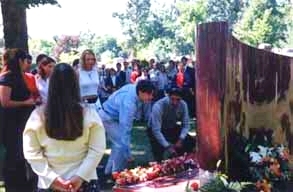 Aside from the floral tributes and flowers
presented by individuals and collectives, the Memorial was
adorned by 60 red carnations and 10 yellow carnations,
representing the number of years since the
birth of Comrade Bains, and the 10 years that have passed since
the Chertsey meeting.
Aside from the floral tributes and flowers
presented by individuals and collectives, the Memorial was
adorned by 60 red carnations and 10 yellow carnations,
representing the number of years since the
birth of Comrade Bains, and the 10 years that have passed since
the Chertsey meeting.
The ceremony was a beautiful and moving revolutionary tribute to the building of the New World. It was followed by a reception which featured the showing of a video produced for the occasion. Entitled The Party's Word Is Its Deed, Hardial Bains: A Portrait, the video brought out how, throughout his political life, Comrade Bains was an instrument of building the Party which turns its words into deeds. It was highly appreciated by the comrades, friends and family members in attendance who stayed for a long time after, discussing with one another and sharing this important occasion.
 Those present were deeply moved by the day's
proceedings and expressed great pride in the
work of the Party to have such a beautiful and permanent
tribute to the memory of Comrade Hardial Bains and other Party
comrades who have passed away. During the late afternoon and
into the
early evening, comrades and friends returned once again to the
site of the Party Memorial, where a Party photographer was on
hand to take photos. They took their time to admire the majestic
beauty of the red granite flag of modern communism that stands
in memory of our comrades and the deed of the Party, as a
symbol of the profound appreciation of the working class and
people
for their dedication to the cause of building a new
world.
Those present were deeply moved by the day's
proceedings and expressed great pride in the
work of the Party to have such a beautiful and permanent
tribute to the memory of Comrade Hardial Bains and other Party
comrades who have passed away. During the late afternoon and
into the
early evening, comrades and friends returned once again to the
site of the Party Memorial, where a Party photographer was on
hand to take photos. They took their time to admire the majestic
beauty of the red granite flag of modern communism that stands
in memory of our comrades and the deed of the Party, as a
symbol of the profound appreciation of the working class and
people
for their dedication to the cause of building a new
world.
Video
The
Party's Word Is Its Deed
Hardial Bains -- A Portrait
This video was produced for the occasion of the dedication of the Party Monument on August 15, 1999, and brings out how, throughout his political life, Comrade Bains was an instrument of building the Party whose deed is its word.
To view the video click here.
CPC(M-L) Emphasizes Need to Pay Serious Attention to Elaboration of Modern Communism
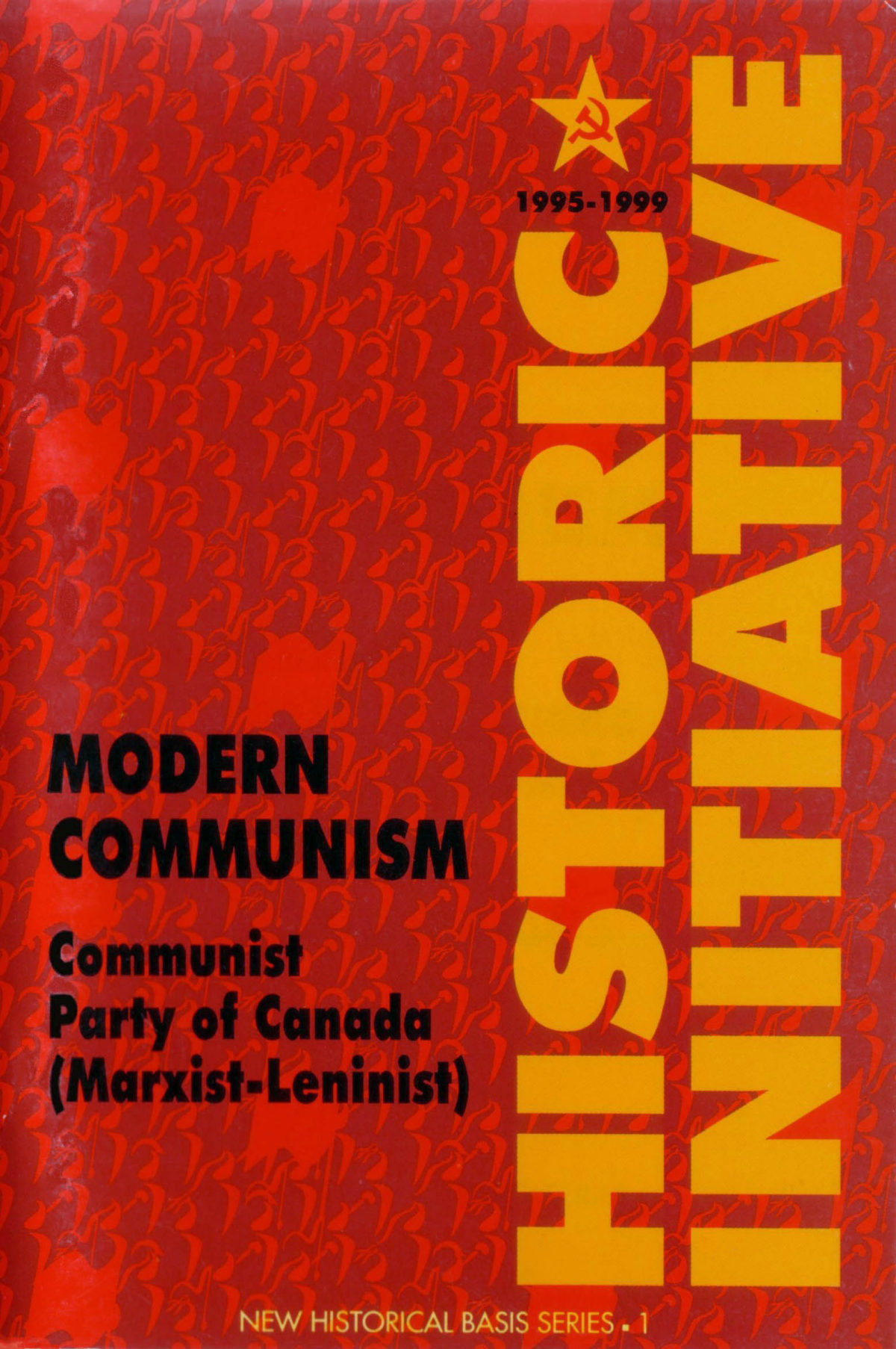 One of the key contributions made by
Hardial Bains to the communist and workers' movement was
to elaborate modern communism. Besides numerous speeches and
other writings on the subject, Hardial Bains wrote a pamphlet
in 1996 entitled Modern Communism, Communist Party of
Canada (Marxist- Leninist). With this pamphlet he
reiterated the need to elaborate the theory that the communist
and
workers' movement requires today to open society's path to
progress. Without this modern theory society has no prospect
whatsoever. Deprived of an outlook that enables the working
class to
think and organize as a class of and for itself, the class is
incapable of emancipating the society from the shackles
of the monopolies and oligopolies, from the clutches of the
imperialist system of states whose crisis of governance has
plunged humankind into an abyss of wars, destruction and
insecurity on all fronts.
One of the key contributions made by
Hardial Bains to the communist and workers' movement was
to elaborate modern communism. Besides numerous speeches and
other writings on the subject, Hardial Bains wrote a pamphlet
in 1996 entitled Modern Communism, Communist Party of
Canada (Marxist- Leninist). With this pamphlet he
reiterated the need to elaborate the theory that the communist
and
workers' movement requires today to open society's path to
progress. Without this modern theory society has no prospect
whatsoever. Deprived of an outlook that enables the working
class to
think and organize as a class of and for itself, the class is
incapable of emancipating the society from the shackles
of the monopolies and oligopolies, from the clutches of the
imperialist system of states whose crisis of governance has
plunged humankind into an abyss of wars, destruction and
insecurity on all fronts.
Hardial Bains pointed out that the key thing in the elaboration of modern communism is not to take up what constitutes the "right-wing" and "left-wing." The key thing in modern communism is the sharpening of the struggle between the new and the old, the struggle between the working class and the bourgeoisie, between the epoch of the working class, socialism and communism, which is coming into being and the epoch of the bourgeoisie, which is passing away.
In carrying out study and discussion of modern communism, the aim is to elaborate its essential features and to involve everyone workers, women, youth and students in the discussion. Such a study and discussion makes it possible for the organizations of the Communist Party of Canada (Marxist-Leninist) to elaborate their opinions on the matter and take these to all sections of the society.
Hardial Bains' insistence that everyone must study and discuss modern communism was put forward as one of the most important practical problems at the present time. Appropriate tactics must be developed to ensure that this study and discussion goes into all sections of the society. To study modern communism and elaborate theory as a guide to action has become a crucial aspect of the constant work of any organization of CPC(M-L) in good standing. The experience of the Party is very positive in this regard as it clearly reveals that all dogmatic rendering of Marxism-Leninism blocks the ability to think and act and must be rejected as a starting point. Only in this way can the Party organizations march in step with the requirements of the communist and workers' movement at any particular time.
Hardial Bains pointed out that unless modern communism is established as something important that people should study and discuss, as something crucial in the political life of the country, the outlook of the reactionary ruling elites will continue to disinform the polity.
"As the working class and the broad masses of the people fight the anti-communist and anti-social offensive, they need a theoretical and ideological basis on which they can develop their struggle. Just to have a number of demands, objections or complaints against this or that policy will not do. To demand that the governments must change their policies is the old way of doing things. Work for the creation of a new system through which people can exercise control over their lives has to be developed. The starting point, in this respect, is the aim, the goal of creating a new system. All demands, all protests, all complaints must be raised within the framework of creating a new system," Hardial Bains explained. To contribute to this work he wrote the pamphlet Modern Communism, Communist Party of Canada (Marxist-Leninist).
Hardial Bains said, "The study and discussion of the pamphlet will enable people to begin thinking about creating the new system."
Comrade Bains pointed out that the world is weighed down by the old emphasizing that "the capitalist system and the bourgeoisie are the old." He elaborated this further saying:
"All the measures taken by this moribund class through its government and the state, or via the economic institutions are decidedly self-serving and contribute to the deepening of the crisis. This class is well aware that its epoch has come to an end. It wants desperately to prolong its existence and presents itself in various garb to fool the gullible, even that of a 'radical reformer' posing as if it has something to offer to change the situation. This 'radical reform' is merely to prolong its own life by blocking the opening of the path for the progress of society.
"Workers, women, youth and students have to become conscious as to what this old is up to in the different spheres of life and defeat it. The old's greatest claim to fame is that it has won victory over socialism and communism but this is also the reflection of its greatest bankruptcy.
"What is new is the socialist system and the working class. Neither the socialist system nor the role of the working class at this time are a matter of following a dogma. It is a matter of drawing conclusions from the concrete conditions, analyzing which direction society is heading and the direction to which it must head. By the turn of the twentieth century, it had already become amply clear that the working class spontaneously gravitates towards socialism. The socialist system actually came into being by combating the prevailing bourgeois ideas and prejudices which attempt to divert this gravitation from achieving its goal. However, the victory of socialism and the subsequent colossal developments were followed by the collapse of the Soviet Union and the countries of Eastern Europe. This has proven that there are elements within the working class whose mission is to use the working class as the material weapon against socialism and communism. In other words, right in the midst of the working class, the struggle has erupted between the old and the new, between champions of the capitalist status quo and the forces of socialism and communism.
"It has become quite self-evident that there is a concerted effort to completely de-ideologize the working class. It is a program to ensure that the capitalist status quo is defended by fair or foul means. However, the collapse of the Soviet Union and Eastern Europe, and the rise of the anti-social offensive in the capitalist countries is teaching the working class that the capitalist status quo is no solution."
Hardial Bains then posed the most important question: "Where is the working class to go now? What is the working class to do?"
The starting point to answering these questions was the study and discussion of the pamphlet Modern Communism, Communist Party of Canada (Marxist-Leninist). The significance is that Marxism-Leninism is not a dogma, but a guide to action.
"After serious study and discussion of this pamphlet, workers will have to go further. They will have to discuss what kind of system they want. They will have to work out and elaborate a system that will enable people to exercise control over their lives. CPC(M-L) does not take a sectarian approach on this vital question. The working class must exercise its own initiative to establish a new system for its own emancipation as the condition for the emancipation of all humanity," Hardial Bains pointed out.
Author's Preface to 1998 Edition of
Necessity for Change
TML is reprinting below the Author's Preface to the 1998 Edition of the Necessity for Change! by Hardial Bains. The Necessity for Change! pamphlet, originally published in 1967, begins with a determined and thoroughgoing offensive against ideological subversion and block to development through social forms. It does so by giving the most revolutionary call, "Understanding requires an act of conscious participation of the individual, an act of finding out," placing action in the first place and understanding in its service.
***
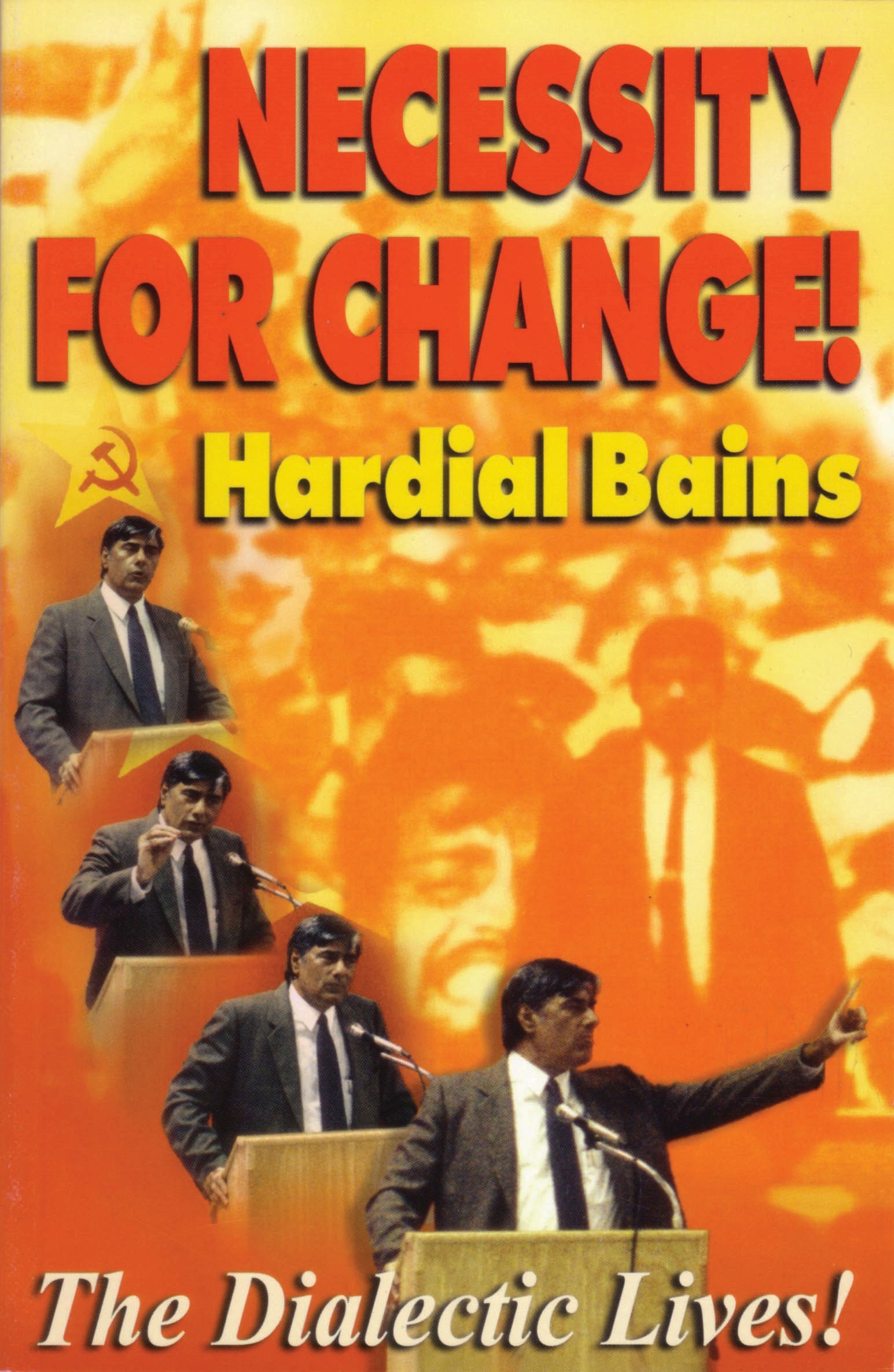 The year 1997 marks the thirtieth
anniversary of the publication of the Necessity for
Change! pamphlet by The Internationalists. It
puts forward the analysis that lays down ideological
remoulding as the key to the uninterrupted advance and victory
of
revolution. Basing themselves on the concrete contemporary
situation
and the problems of the working class movement, The
Internationalists took up the questions of
organization and the role of the individual in the revolutionary
transformation within the context of the work of the
collective. To achieve this, The Internationalists launched
their
most resolute offensive against the prevailing culture in
ideological and social forms, so as to prepare the
subjective forces for revolution in the course of waging the
revolutionary class battles.
The year 1997 marks the thirtieth
anniversary of the publication of the Necessity for
Change! pamphlet by The Internationalists. It
puts forward the analysis that lays down ideological
remoulding as the key to the uninterrupted advance and victory
of
revolution. Basing themselves on the concrete contemporary
situation
and the problems of the working class movement, The
Internationalists took up the questions of
organization and the role of the individual in the revolutionary
transformation within the context of the work of the
collective. To achieve this, The Internationalists launched
their
most resolute offensive against the prevailing culture in
ideological and social forms, so as to prepare the
subjective forces for revolution in the course of waging the
revolutionary class battles.
The creation of a new class, such as the working class, has brought forth its own ideology and social form with its own coherence. The ascendancy of the working class has left its imprint to the extent it is fighting for its own interests and its own new coherence. The most distinguishing feature of the working class, making it so distinct and radically different from all other classes, is that it cannot emancipate itself without emancipating the entire humanity. Thus, its new coherence has to be consistent with its aim of emancipating the whole of humanity.
The capitalist class, the old class, as it is passing away, has introduced its own notions of emancipation, its own corruption into the working class movement. It calls upon the workers to fight for "a bigger slice of the pie," for a redistribution of wealth, while keeping the old society intact. It has created an untenable situation whereby the working class finances its own leaders to fight against its own interests.
By 1967, these bourgeois tendencies had also entrenched themselves in the communist movement and brought it to the point of liquidation, against which a huge movement developed. A number of tendencies were taking shape in this struggle, from purely intellectualizing about what the "most correct" position should be, to merely linking with some centre whether in Moscow, Belgrade, Beijing, Europe or any other.
The Internationalists linked the ideological struggle and the struggle against bourgeois culture with the concrete work to build and strengthen an organization. The Necessity for Change (NFC) analysis was directed towards making people conscious about this approach. With its broad sweep, the analysis presented a vision that aroused everyone to undertake ideological work and take up the social forms consistent with their tasks. It was a clarion call for the activists, communists and those aspiring to be communists to break with the old conscience, the anti-consciousness, the "particular prejudices of society, transmitted through parents and social institutions." This call was linked directly with "seeking the truth to serve the people." The NFC analysis forcefully provided a world outlook based on Marx's dialectical and historical materialism as a guide to action and provided a solution to tackle the problems of ideological struggle and social forms.
The contemporary schools of irrationalism, which are so desperately promoted in the official circles, have one thing in common with what was being propagated in the sixties. It is their dogmatic assertions and the attitude of acting blindly. On the one hand, it is asserted that there is no real world and, therefore, the starting-point of gaining an outlook must be that the world does not exist. The same dogmatic notion appears in the form that the "real world" exists, but that it is impossible to transcend, thus causing "existential despair." In either case, reality is presented as a matter of interpretation and definition, and there is no action with analysis. By disclosing the relations of human beings with society and nature, the NFC analysis broke through all the irrationalist trends thrown at the people. Similarly, this analysis and ideology are needed today.
The NFC analysis begins with what is given. It analyses the given to overcome it and to establish what really is within those conditions. It establishes a valuable approach and provides a concrete way to tackle reality. It begins by taking up the important question of history. Under the section History-As-Such, the NFC puts forward the profound role of history, as opposed to what merely exists at the present time.
History, according to our historicism, begins from the present. It reveals in precise terms the problem, which has been brought forth for solution. It is the solution of this specific problem, which creates history. If the problem, as an historical problem, or, if the contradictions which are historical, are not resolved, there will be no forward march, and thus no history. The NFC analyses that a chronicling of history, which begins from the past and is written according to the interests of "various classes of people who have usurped power by force," is actually a device to stop people from really seeing how a problem was created and how it must be sorted out. The NFC analysis explains that the "human condition cannot be understood in terms of their definition of history as they are but the chroniclers of the activities of the ruling classes."
The NFC actually made history. It revealed how revolutionary forces could march from point A to point B, ensuring that each step becomes a cornerstone in the development of history. Today, as was the case in the sixties, the ideological struggle and culture in social form have assumed the first position in the building of a revolutionary organization and in the creation of subjective conditions for revolution. For instance, can a communist party be strengthened if it withdraws from the ideological struggle against the class enemy or wages it in an unprofessional, amateurish and spontaneous manner? The answer is no, it cannot strengthen itself. Can it have members who place the accumulation of private property or building their "careers" in the first place? Or can a Communist Party realize its tasks by having members whose culture in ideological and social form is bourgeois? The answers, again, are no. A Communist Party, if it is to realize its tasks in a mature, professional and on-going manner, must develop revolutionary culture in ideological form, on the one hand, and the revolutionization of culture in social form, on the other. The NFC analysis precisely establishes the framework for doing so. It sorted out the problem of revolutionary politics and bourgeois culture. This is why this work is called historic. It was history-making work and remains so. History will be made today as the people adopt the outlook of the NFC to resolve the existing contradictions. This revolutionary way of resolving the existing contradictions will be history-making.
By repudiating the idealism of Feuerbach, Karl Marx highlighted that "many philosophers have only interpreted the world in various ways; the point, however, is to change it." Thus, he served notice that the Necessity for Change must be placed in the forefront of all work. Guided by this outlook, The Internationalists, as an organization, was able to strengthen itself in a step-wise manner. For The Internationalists, each period brought forth a crucial problem to be resolved. The Internationalists went ahead and sorted out that problem and strengthened itself in doing so. Since 1970, CPC(M-L) has also strengthened itself on this basis.
For over thirty years, the main task of these revolutionary organizations was to create the subjective conditions for revolution. At each point in the development of the work for its realization, the Necessity for Change brought forth the question specific to the time. Unless it is profoundly appreciated that there is a Necessity for Change at each point, and theoretical and practical measures are taken to bring about the change, there is no possibility of creating the subjective conditions for revolution.
The Internationalists waged the struggle in the sixties against the "idealist" anti-revisionists whose most characteristic feature was that they merely took the posture of anti-revisionism and did nothing to change the situation. The NFC analysis also gives notice to all who are posturing today or who may posture in the future and who proclaim they were or are members of The Internationalists or CPC(M-L) but in fact do nothing to change the situation.
A bourgeois party can have a member, and actually must have a member, who merely postures. Such a party is a party of the capitalist status quo; it cannot afford to have members who are dedicated to changing the situation from capitalism to socialism through revolution. CPC(M-L), on the other hand, cannot afford to have members who do not see the Necessity for Change and do not bring it about. The NFC analysis, for the first time, provided The Internationalists with an ideological stance and a method to actually build the revolutionary Marxist-Leninist Party of the proletariat.
By beginning from history-as-such, the NFC analysis places the attitude, consciousness and work of the individual right at the centre within the context of the work of the collective. This individual is not for himself/herself but is a social class individual, an individual for the working class. The NFC analysis calls upon all class-conscious workers and revolutionary activists to become that individual, an individual with the consciousness and organization of the Necessity for Change, an individual who is indispensable to the creation of the subjective conditions for revolution. The NFC analysis has brought forth and established what kind of individual it is and of what stuff that individual is made.
The NFC analysis also provides a detailed picture of what kind of individual this existing society spontaneously creates. This individual has anti-consciousness, but this anti-consciousness is not a permanent feature. The brain reflects the sharpening class contradictions in the society and other developments. Either the individual transforms this reflection into social consciousness and becomes part of the human factor/social consciousness or remains part of the anti-human factor/anti-consciousness. The NFC analysis beckons everyone to go into this situation and not to fall into the trap of "going out."
The capitalist class claims that capitalism is the highest form of human society. Naturally, if this is the highest, then there are no history-making tasks. History has come to an end. People can indulge themselves within the existing possibilities of a society split into classes with the tendency of the rich becoming richer and poor poorer. But there is a higher form of human society, socialism, which is the transition between capitalism and communism. The NFC analysis calls upon people to take up the transformation from capitalism to socialism as their main task.
Revisionists and opportunists of various kinds, however, present the bourgeois social forms as the ideal motivating humanity. This form is based on subordinating all human beings to private property. Serving private property in this case becomes the highest ideal and the only aim of everyone alive. Besides fighting for "a bigger slice of the pie" and for job security which this system can never provide, these people, as dogmatists and fanatics, oppose everyone fighting for social revolution.
The NFC analysis set clear lines of demarcation between those who were revolutionist in the true sense of the word and the liberal and pacifist, the defenders of the capitalist status quo. It called for "a movement for the development of a new human person," a human person who can be created with the "complete elimination of the basis of this exploitation." For the first time, the NFC analysis placed the individual in the position he or she deserved and called upon each to create the new society as a precondition for the creation of a new human person. Anyone who took up this analysis was a new human person, and the creation of a new society was the precondition for all human beings to become this type of individual, or, even better, in terms of that quality born of the Necessity for Change.
The NFC analysis presents, as an integral whole, the entire ideological work, political struggle and organizational tasks, including the remoulding of the members, in order to transform them into militant revolutionary communists. At the same time, it brings forth the specificity of each struggle, the role each struggle plays in the creation of the subjective conditions for revolution. This complete picture of the struggle creates that consciousness which is indispensable for the development of the movement.
The offensive to establish an organization is the key thing, the most important element in the preparation of the subjective conditions for revolution. This organization is the most advanced and most revolutionary instrument of proletarian revolution in a society where such revolution has not yet taken place, and an instrument of expanding the power of such a revolution where it has. Reluctance, vacillation, amateurishness, spontaneity and aloofness about such a matter of creating that most advanced, most organized, vanguard of the working class would finish the revolution before it even got underway.
In a society where bourgeois individualism is presented as the highest development of humankind, the individual really has no place. This society curtails any individual initiative within the framework of the aim of the working class to emancipate itself. With its ideological subversion of individual initiative and its block against development through social forms, the prevailing culture is the front line to protect the capitalist-imperialist system against those fighting it.
The Necessity for Change! pamphlet begins with the most determined and thoroughgoing offensive against this ideological subversion and block to development through social forms. It does so by giving the most revolutionary call, "understanding requires the conscious participation of the individual, an act of finding out," placing action in the first place and understanding in its service. In so doing, The Internationalists smashed the prevailing bankrupt notion of placing understanding as the prelude, a precondition to action. If an individual, collective, or both is to have any understanding, action is its precondition. This action is considered not merely a thing-in-itself divorced from everything else but "an act of conscious participation," "an act of finding out." This revolutionary pamphlet not only puts action in the first place but also stresses the quality of participation and the action according to a plan known as "Action with Analysis."
In Canada and other modern capitalist societies, the social process of production has placed the socialization of the means of production, an action by the entire collective for its own ends, for the emancipation of the working class and all humanity, as the most urgent strategic question for resolving the contradictions which give rise to anarchy, violence and plunder. Such a task of the collective, with its explicit aim, must be taken up consciously and with a plan. Such a consciousness and plan is not going to fall from the skies. It is not inherent to humankind nor does it develop spontaneously. The clarion call, "understanding requires the conscious participation of the individual, an act of finding out," provides the solution. The revolutionary forces must begin with their plan and their actions must be consciously carried out to realize it. The Necessity for Change analysis neither rejected the role of "understanding" nor exaggerated it, as did the prevailing culture in ideological and social forms. The Internationalists acknowledged it and assigned it to the place to which it belonged.
As in the sixties, so too today many people plunge into actions. This is literally the case of the millions who are participating in the struggle against the anti-social offensive and for the pro-social program which has erupted from coast to coast in Canada and internationally. Many of the activists who take up responsibilities to organize various actions come to see that their actions in themselves will not obtain the desired results. With these actions as an indispensable weapon for their work, they must create an organization, the most crucial subjective force to lead and steer their struggle to victory. Such work brings these activists face to face with the reality of ideological subversion of the class enemy who uses culture in social form as an obstruction to the achievement of a goal. If such a work is not done, the first fatality will be the new coherence. The Necessity for Change analysis given during the study program of the same name, which had its expression in the Necessity for Change! pamphlet, provided that new coherence, the Necessity for Change. People in action are not merely an occasion for organizing more of the same, but an occasion to organize themselves. This organizing part, this ideological edification of the struggle, this creation of new social forms, this creation of the new coherence at the heart of the new organization becomes the guarantee of success and final victory.
The Necessity for Change analysis electrified and radicalised the situation, with the work of The Internationalists taking off in its full majesty. After a period of over three decades, this organizing work continues as the guarantor of every victory. The Necessity for Change! pamphlet and the analysis which made it famous was thus not merely an essay for enlightening others, but an instrument for the momentous development of this work. Activists saw that merely participating in an action, in a strike struggle, a demonstration and a march was not enough; the organizing work as a guarantor of its victory is a first priority. The revolutionary force of this Necessity for Change analysis was such that it radically transformed the situation. The entire movement began buzzing with the words and phrases from this analysis and took up work for the building of the organization. Today, thirty years later, literally every day people write to CPC(M-L) wanting to join this work as more and more activists have begun to see that without this work there is no guarantee of victory.
The Necessity for Change analysis confronts head-on the pretensions of the capitalist class, which makes claims that it is for revolution, for change. The Internationalists were aware that the capitalist class is no longer revolutionary and that it preaches "individualism," "understanding" and an ideal struggle merely to create doubt amongst the people about their possibilities of achieving anything and to destroy their self-confidence. It deliberately confuses the people about culture in social form and pits the same against their own struggle and their own organizing work. The aim in doing so is to get the people to do what is most detrimental to their own interests. The working class cannot emancipate itself and the entire humanity without carrying out the organizing, without working out and establishing the new coherence, without smashing ideological subversion and the old conscience, which is thrown at them in order to disorient them. When The Internationalists placed the organizing work in the first place within the framework of the new coherence, words and phrases like History-As-Such, Anti-Consciousness, the Fascist "I" and others became the bombs and the machetes through which the path for the movement began to be opened. A new coherence began to spread contributing to the success of the work of The Internationalists.
One of the greatest contributions of the Necessity for Change analysis was the exposure that a human being with a brain, with all the attributes of a living person, has an objective place in the society. These living beings, these Homo Sapiens are humanized social beings. They are part of an objective world. Ideas, theory, social forms and the prevailing incoherence reflect the block against the further development of the society. The Internationalists recognized this block and worked out what was needed to smash it. The new coherence of The Internationalists, the product of smashing this block, arose as an objective, sensual, material activity, even though it is part of consciousness, the side of "understanding," the side of "an act of conscious participation," the side of "an act of finding out."
Activists of The Internationalists, the cadres and sympathisers, all of a sudden, rose out of their anti-consciousness, took their place in the society as revolutionists and created the subjective conditions for the development of the workers' and communist movement. They saw the subjective conditions as part of the world and that it is precisely that world which must be tackled. How irrational it is to say, as does the capitalist class, that those who are part of the world do not know what they are part of. Some have degenerated so far during the three decades of Necessity for Change analysis that they have begun to openly attack epistemology, theories of knowledge, which is the product of human circumstances. They insist that human beings must reject these theories of knowledge since, according to them, to have a theory of knowledge presupposes the existence of knowledge and its transposition over reality.
In fact, theories of knowledge come out of reality itself, that is the human and natural environment, and their validity is wholly and solely dependent on reality. They do not attack these theories for being inconsistent with reality. They attack the most human of human qualities, the ability to cognize. Their commandment is that "thou must not cognize." This same commandment demands action for action's sake and opposes organising work in the manner formulated by The Internationalists.
Using the lingo of that period, The Internationalists dealt with the most complicated and difficult question of the "I". It was very clear that unless this question is dealt with it was not possible to smash the block to the organizing work. The Necessity for Change analysis pointed out that "'I' is a relate or relationship. 'I' is not an abstraction, a mere product of thought, but a phenomenon, or something which sees the phenomenon and not only sees it but acknowledges it; not only acknowledges it but analyses it; not only analyses it but reflects it in return. 'I' goes out there and acknowledges the situation, reflects it, receives the reaction to the reflection and carries on. This 'I' is not a quality which will remain the same forever. In this regard, it cannot be said that it is a defined quality."
Leaving everything else aside for the time being, the Necessity for Change analysis made the statement that "'I' is a relate or relationship." For this relationship to assume its full vitality, there must be something in existence independent of this "relate or relationship" whose relate or relationship it is. "I" is a "relate or relationship" of the world, both social and natural, a relate or relationship of what is independent of itself. Nay more, "I" is dependent on the social and natural world. Arguing in this manner, the Necessity for Change analysis places the human being, in this instance, the working class, at the centre stage of all developments. The capitalist class places "I" in the first place and declares that this "I" can have whatever ideas it wishes. In the real world, this is not the case. "I" can be transcended but not the world. In fact, this "I" has not remained the same because the world changes, develops and moves with this "I". No, claims the capitalist class. It is "I" which determines what the world can be because the only thing which exists really is this "I" and all the world is merely the interpretation this "I" gives it. The Necessity for Change analysis debunked this assertion and called upon the activists to overcome this block by their "act of conscious participation," by their "act of finding out."
Does the "I" have any role in development? The Necessity for Change analysis answers this question in the affirmative, while the capitalist class, whose claim to fame is that it is for the individual, answers extremely vociferously in the negative. How is it that the "self-consciousness" of an historical period, the "I" or "relate or relationship" of that period, has no impact on that period? What kind of "I" is that? The Necessity for Change declares that an "I" which does not influence the world does not exist, while the capitalist class presents the "I" and the "world" as two separately existing entities. The Necessity for Change analysis strongly places the "I" and the world in their dialectical relationship of both unity and separateness, the "will-to-be" as the objective expression of the mode of this existence. An "I" with its "will-to-be" does influence the world in a very specific way. A successful revolution can transform the world in some very definite direction, but whether it will happen, in the final analysis, is still dependent on the world. It is this dependence of the "I" as a "relate or relationship" on the world which makes it possible for human beings to play their crucial role in the development.
"Do your own thing" was the battle cry of the capitalist class which claimed that this was the highest anyone could achieve, just as today this battle cry is expressed in the demand that everyone must fend for themselves, thereby denying the very conception of a society which is responsible towards its members. But the Necessity for Change analysis refutes this, pointing out that if such a thing is done the people are actually placed in opposition to their interests. The Necessity for Change analysis points out in depth that there also exists the egocentric "I" which is not a "relate or relationship." It does not depend on the social and natural world. On the contrary, it exists only because of the capitalist class. It is so temporary and partial that it will disappear with the disappearance of the capitalist class.
"Doing your own thing" is an extremely deceptive and harmful call, a piece of fiction, suggesting that the capitalist class is really interested in individual initiative. As long as "doing your own thing" means the rejection of the world, the capitalist class quite gleefully supports it. The NFC analysis fully recognized that there were many people participating in different struggles, many of which suffered from the illusion that just a demonstration here or a strike there would remedy the situation. The egocentric "I" kept demanding that they must remain aloof from the problems of building their organization, the most crucial subjective force for the realization of any of their tasks. This aloofness from building organization was accompanied by an extreme reluctance to take up the ideological content of opposing the status quo and having the appropriate social form, that is culture in social form, which would facilitate the organizing. In other words, this was an opposition to deep-going revolutionization in the course of the working class movement for emancipation, the precondition of its victory. It was extremely sad and tragic that millions of those who participated in the struggle remained aloof to building that organization which would facilitate its victory. This happened under the influence of the capitalist class.
The NFC analysis further reveals that there exists anti-consciousness-beyond-itself-in-itself. This is an illusion that the situation can be changed without the working class taking up the task to bring it about. Having gone into the depth and breadth of this problem, the NFC analysis clearly established that the most important factors for victory are organization and ideology, along with culture in social form, which facilitates the two. In the absence of this there is no way a revolutionary movement can be imbued with revolutionary theory. In fact, no organization can lead anyone to victory if it does not develop culture in its ideological and social forms in order to facilitate the development of the movement on an uninterrupted basis.
The crucial ingredient for victory is the human factor/social consciousness, but this factor cannot exist in a vacuum. This factor finds its highest expression in an organization, which is strengthened on an on-going basis with the sound foundation of a new, modern and revolutionary culture in ideological and social forms. The concrete conditions of the sixties brought forward the questions of organization, ideology and social forms for solution. The NFC analysis called upon the activists to go into these questions. It was a call to involve themselves in the social revolution instead of "doing their own thing" or "going out," hoping that the problem will disappear on the basis of "changing oneself" which amounts to the same thing.
The NFC analysis provided sound arguments that there is something wrong with the world, while the capitalist class preached that there is something wrong with the people, especially the workers, women and youth. The battle cry of The Internationalists was "Change the World," while the battle cry of the capitalist class was "change the individual." The NFC analysis of the "I", of the existence of this "relate or relationship" placed the task of changing the world on a profound social basis.
A "relate" or "relationship," if it is to be true to itself, must be objective, independent of everyone and dependent on the world. This relate or relationship must be continuously discovered and rediscovered in the course of struggle. It constitutes the centre around which all other consciousness is placed. In the sixties, this relate or relationship was expressed by those who wanted change but remained indifferent to doing anything about it. The same is the case today. This is the same relationship, which reflects the drive of the capitalist class to organize all its forces against social revolution. This class dispatches its forces against people taking up the problems of organization and culture in ideological and social forms for solution. This class lures many young people away from taking up these problems, diverting them into activities harmless to the capitalists but destructive to themselves. The NFC analysis cut across all the bourgeois diversions and placed the solution of problems in the first place and actually did find solutions. Had The Internationalists not adopted the NFC analysis as its own, this organization would have had no future either. The same problem poses itself today.
The prevailing factor, that is everything that the capitalist class hopes would safeguard its future, can be summed up in its anti-human factor/anti-consciousness. The bourgeoisie has developed this factor by strengthening all its institutions and by enforcing the opinion that it is by strengthening and preserving these institutions and the arrangements they are established to ensure, that all problems can be "solved." According to the capitalist class, neither human beings nor their social consciousness play any role in solving problems. It places in the first place private property and the institutions created to defend it, along with the ideology of irrationalism. The bourgeoisie subordinates human beings and the human factor/social consciousness to them. The capitalist class uses the anti-human factor/anti-consciousness as a weapon against all social forces for change, development and motion. The NFC analysis is a great blow to the capitalist class; it refutes its claims that it is really for the individual and wants such an individual to be "free."
In all its work CPC(M-L) pays first-rate attention to the human factor/social consciousness. No work can be realized without bringing it into play. CPC(M-L) must be seen as the political party which has as its main interest to raise the ideological, theoretical and political level of the working class and people so that they themselves can work out and build that system which will enable them to exercise control over their lives. Whether it is consolidating an aspect of the work of CPC(M-L), fighting the anti-social offensive or winning the battle for a pro-social agenda, the first problem which arises is of the human factor/social consciousness. What is the state of the human factor/social consciousness? What is needed to bring it on par with what is required to make the work successful? Raising these questions and finding the ways and means of doing what is necessary is the beginning of the development of the human factor/social consciousness. The NFC analysis provides this problem with a solution.
Hardial Bains, May 2,
1997
(To access articles individually click on the black headline.)
Website: www.cpcml.ca Email: editor@cpcml.ca



